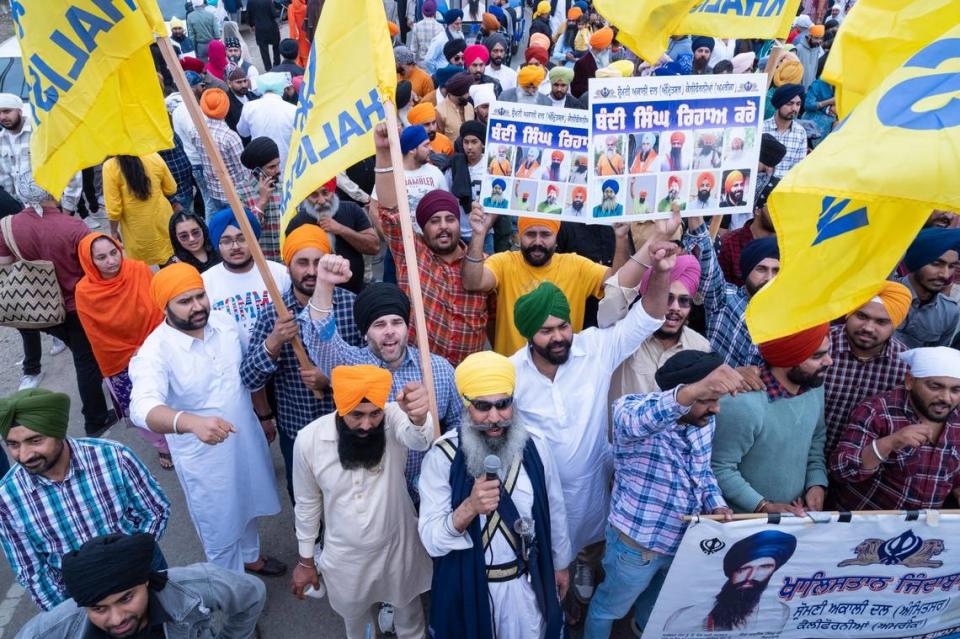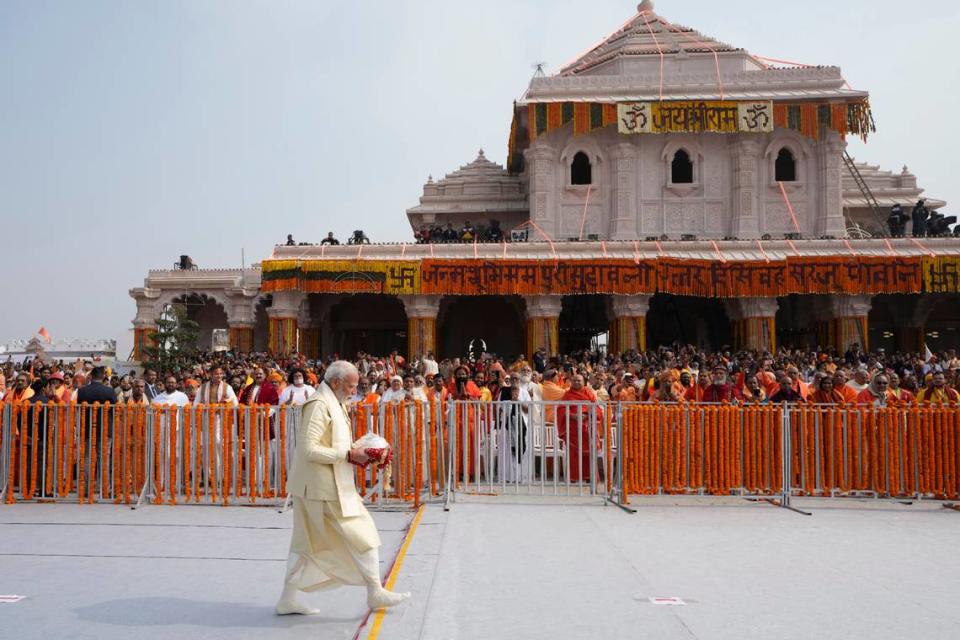Sikhs of California to vote on splitting from India, creating independent nation
- Oops!Something went wrong.Please try again later.
In a practical sense, the non-binding referendum vote that will take place Sunday in San Francisco might best be described as wishful thinking. But to many of the estimated 250,000 Sikhs in California, this exercise in democracy could not be more meaningful.
Why? Because at its core the issue on the ballot is freedom.
Specifically, Sikhs voters are being asked whether part of the predominantly Sikh state of Punjab should break away from India and form an independent nation called Khalistan.
The effort is vehemently opposed by India’s ruling Hindu nationalist government, which has labeled those pushing for Sikh independence as terrorists — and is alleged to have even assassinated one of the movement’s leaders.
Still, among Sikhs in the Central Valley the moment is stirring defiance and passion. Some are so passionate they say they are willing to die for the cause.
“With each cast vote, a Sikh martyr will be liberated and finally be at peace, exonerated from their spiritual obligation not to rest until the eternal home for Sikhs is built,” said Gursharanjit Singh, a West Sacramento resident and school administrator who plans to caravan with around 45 family and friends from Sacramento to San Francisco.
Gurdeep Singh, a 53-year-old Fresno truck driver who is active with the organization Sikhs for Justice, said he expects around 5,000 Sikhs from the Fresno area alone to make the seven-hour round trip.
“We want freedom,” Singh explained. ”We want our kingdom back.”
The vote isn’t happening all at once. The referendum has been underway since 2021, making stops in important Sikh expatriate hubs such as England, Australia, and Canada. Organizers say the goal is to pressure India to hold a binding referendum in Punjab, perhaps in 2025.
The task of making sure the voting is free, fair, and tabulated accurately, has been assigned to The Punjab Referendum Commission, a panel of direct democracy and political experts chaired by Dane Waters, a former official in President George H. W. Bush’s administration and a veteran Republican strategist.
Waters told The Bee, “Just to be very clear, I don’t take any specific position on the Sikh referendum. At the end of the day, it doesn’t matter to me a lick whether they have independence or not. Our goal as the commission is just to ensure that they’re using the referendum process, as best they can.”
Despite being long dubbed the world’s largest democracy, under Prime Minister Narendra Modi and his BJP Party, India has moved decidedly away from the inclusive country that Mahatma Gandhi envisioned. Modi embraces a Hindu nationalist philosophy called Hindutva.
The seemingly obscure global Khalistan referendum movement has elicited what appears to be an outsized response from the populist Indian leader. Last summer Modi leaned on Australian officials to cancel the referendum vote there. His government has made unfounded allegations that the primary group organizing the vote, Sikhs for Justice, is a terrorist front group.
As The Bee has previously reported, California elected officials of Sikh descent and Sikh activists say they have been surveilled and threatened, suspecting India.
Serious allegations have also arisen that India has violated U.S. and Canadian sovereignty, targeting citizens with extrajudicial violence.
Canadian Prime Minister Justin Trudeau and Western intelligence agencies have alleged that evidence suggests India was behind the June assassination of one of the leaders of the Khalistan referendum movement, Hardeep Singh Nijjar.
In December, U.S. officials unsealed an indictment alleging that Sikhs for Justice lawyer, Gurpatwant Singh Pannun, was the target of an India-backed assassination plot. The alleged plan was exposed after the plotters offered $100,000 to an undercover American agent they thought was a hitman, to kill Pannun.
“If the cost of helping lead a referendum campaign is going to be a bullet waiting for me, I’m ready to pay that price.”
In an exclusive interview, Pannun told The Bee that he takes threats to his life seriously. Still, he said that “nothing could stop” him from coming to San Francisco for the referendum.
“This issue is not about threats to my life or an assassination attempt,” Pannun said. “This is about the existential threat that the Sikh community is facing under successive Indian regimes.”
“In Sikh teachings,” he added, “which I follow very dearly, the day we are born, the date of our death is written, and nobody can change that. And if the cost of helping lead a referendum campaign is going to be a bullet waiting for me, I’m ready to pay that price. We are going to defy India’s bullets and violence with the ballot and our vote.”
Punjab Commission Chair Waters says that he has been stunned by India’s opposition to what he says is an important exercise in direct democracy. “They’ve done everything from assassination to arresting people in India as terrorists just for wearing T-shirts promoting the Sikh referendum.
“If I were advising the Indian government, and I advise governments all over the world, I’d say, ‘just ignore it.’ But they’re making more of an issue of it, which is giving greater power and credibility to the Sikh movement.”
Robert Rueca, spokesperson for the San Francisco Police Department, told The Bee they are prepared. “The department has been in contact with the organizer for this event. We have plans in place to address public safety issues, but we are precluded from disclosing this information for security purposes.”
Since the 1980s, the conflict over Sikh independence has at times turned violent.
In 1984, following an Indian military operation dubbed Blue Star, India’s government attacked, with heavy artillery, the holiest Sikh site, the Golden Temple Gurdwarda, killing a prominent Sikh leader along with hundreds of followers. The temple was left a bombed-out shell.
Later in 1984, after Prime Minister Indira Gandhi was assassinated, between 8,000 and 17,000 Sikhs, independent observers estimate, were killed in what the California Legislature declared last year was a genocide.
In 1985, Sikh radicals in Canada were tied to the bombing of an Air India jet that had departed Montreal, killing all 329 people on board.
Today’s pro-Khalistan activists say that they are committed to non-violence. But that has not stopped the Modi government from labeling them terrorists, tacitly justifying the Nijjar killing and other acts of transnational repression. Locally, Sacramento Sikh activist Bobby Singh received a death threat and a visit from the FBI warning his life was in danger.
Sumit Ganguly, a political science professor at Indiana University specializing in Indian cultures and civilizations, said Modi’s claims are almost certainly bogus. “I have talked to certain friends in the US State Department. They tell me that the evidence that India has presented that these pro-Khalistan activists are terrorists is thin gruel.”
The targeting of Sikhs, Ganguly said, “is a way for Modi to signal to his constituency, which is predominantly right-wing: We can be incredibly tough on anybody who even thinks of challenging India’s territorial integrity. And that plays well in certain quarters. With an election coming up this spring, they want to batten down every hatch.”
The issue is somewhat complicated for U.S. officials and the Biden administration, who must balance civil rights concerns and Sikhs’ desire for independence with its important strategic alliance with India.
Bobby Singh, the Sacramento activist, said that with the assassination of his friend and mentor Nijjar, and the plot involving Pannun, Sikhs in California have been “awakened and are especially motivated by the referendum.” Singh said he is helping organize around 60 buses that will bring people from Gurdwara Temples located in such places as Los Angeles, Fresno, Turlock, Modesto and Yuba City. Seven buses are coming from the Sacramento region, Singh said.
Raman Singh, who lives in Yuba City, said he is extra motivated by revelations that India was likely responsible for the killing of Nijjar.
“We have not received any justice for anything,” he said. “Even now Sikhs are being targeted for raising their voice for sovereignty in Punjab while living in Western nations... I believe this referendum voting is essential.”
Could India really allow a Khalistan Referendum?
Joe Mathews, a writer and policy expert studying the potential of direct democracy to address global conflicts, observed Canada’s Sikh referendum, which he described as tense in the wake of the assassination of Nijjar.
“There wasn’t much suspense about the voting, it seemed like the vast majority supported an independent Khalistan. But, if they can get this to go to Punjab, it’s going to be a much closer question.”
The votes will not be counted until all of the elections are held. That said, there is presumed to be overwhelming support among those traveling to voting sites.
Regardless of vote totals — the support for independence is also expected to be overwhelming in California — India political scientist and Modi critic, Ganguly, said he saw no realistic path forward for there ever to be a Khalistan referendum in Punjab. “There is a snowball’s chance in hell of that happening. No Indian government is going to allow it. And I support that stance.”
He added, “I’ve studied this extensively, and not just the Sikh case; I’ve written on other separatist movements in India. We will come up with all manner of federal arrangements; we will accommodate various kinds of local self-government. But one thing we will not talk about is the breakup of Indian states.”
But Sikh leaders say that having endured genocide and their leaders being attacked for pushing a ballot referendum, they must at least try. And they are buoyed by faith.
Dr. Pritpal Singh, a Sikh American leader based in Fremont, who was warned by the FBI last year he could be a target of violence, said that the vote is an important step for Sikhs.
“For some,” he said, “the idea of democratic revolutions seems like a remote possibility. But our history is one of resilience and persistence. It teaches us that even against the odds, we can and will succeed.”
Voting is scheduled to be held Sunday at the San Francisco Civic Center Hall (2 Polk Street) beginning at 9:00 a.m., with gates closing at 5 p.m.


